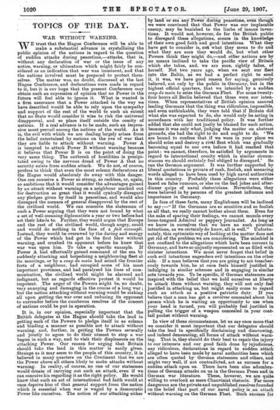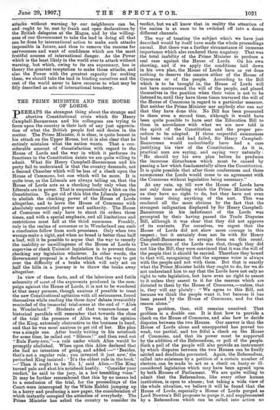TOPICS OF TRE DAY.
WAR WITHOUT WARNING.
WE trust that the Hague Conference will be able to make a substantial advance in crystallising' the public opinion of the nations in regard to the question of sudden attacks during peacetime,—attacks, that is, without, any declaration of war or the issue of any notice, warning, or ultimatum which might fairly be con- sidered as an indication that war was imminent, and that the nations involved must be prepared to protect them. selves. The matter was, no doubt, discussed at the last Hague Conference, and declarations were made in regard to it, but it is our hope that the present Conference may obtain such an expression of opinion that no Power in the future will feel able to ignore it. What is wanted is a 'firm assurance that a Power attacked in the way we have described. would be able to rely upon the sympathy and support of the rest of the world to such an extent that DO State would consider it wise to risk the universal disapproval, and so place itself outside the comity of nations. If a real advance is to be made, such an impres- sion must prevail among the nations of the world. As it is, the evil with which we are dealing largely arises from the belief entertained by nations on the eve of war that they are liable. to attack without warning. Power A is 'tempted to attack Power B without warning because it believes that Power B is on the point of doing the very same thing. The outbreak of hostilities is precipi- tated owing to the nervous dread of Power A that no security exists from' sudden attack. We do not, of course, profess to think that even the most solemn declarations at the Hague would absolutely do away with this danger. One can conceive a Power so strong, so reckless, or, again, so ambitious that it would consider the advantages gained by all attack without warning on a neighbour marked out for destruction so great that it would cynically' disregard any.pledges given by itself in peacetime, and would also disregard the menace of general disapproval by the rest of the civilised world. We can conceive the statesmen of such a Power arguing that they were not bound by what a set of well-meaning diplomatists a year or two before had set their hands to. Further, they would argue that Europe and the rest of the civilised world, though angry, could and would , do nothing in the face, of a fait accompli. Instead, they would be overawed by the daring and energy of' the Power which had got in the first blow 'without warning, and crushed its opponent before he knew that war was upon him. To take a specific 'example. If Power A had effectually gained command of the sea by suddenly attacking and torpedoing a neighbouring fleet at its, moorings, or by a coup as main had seized the frontier forts of a neighbour, bad occupied some of his most important provinces, and had paralysed his lines of com- munication, the civilised world might be alarmed and indignant, but as regards effective protest it would be impotent. The anger of the Powers might be, no doubt, very annoying and damaging in the course of a long war ; but the nation attacking without warning would be staking all upon getting the war over and reducing its opponent to surrender before the cumbrous resolves of the concert of nations could be put in operation.
It is, in our opinion, especially important that the British delegates at the Hague should take the lead in getting each of the Powers to pledge itself in as solemn and binding a manner as possible not to attack without warning, and, further, in getting the Powers severally and 'jointly to agree to do their, 'utmost to stop a war begun in such a Way, and to visit their displeasure on the attacking Power. Our reason for urging that Britain shOuld take the lead in this matter is easily given. Strange as it may seem to the people of this country, it is believed in many quarters on the Continent that we are 'the Power above all others likely to make attacks without warning. In reality;of course, no one of our statesmen wmild-dream of Carrying out such an attack, even' if we can conceive his regarding it as the right policy. He would k-nowthat such an act of international bad faith would at once deprive him of that general support from the nation which is essential when war, is waged by a democratic Power like Ourselves. The notion of our attacking either
by land or sea any Poiiet-during peacetime, even though we were convinced that that Power was our implacable enemy,. may be banished to the limbo of insane inven., tions. It would not, however, do for the British public to disregard -these allegations, secure in. the knowledge of their own good faith and good intentions. What they have got to consider is, not what they mean to do and what they are sure they would do, but what other Powers think they might do,—and other nations are by no means inclined to take the pacific view of Britain which she takes, and, we are sure, rightly takes, of herself. Not two years ago, when we sent our fleet into the Baltic, as we had a perfect right to send it, it was, we have good reason for saying. genuinely believed, not only by the public in Germany, but in the highest official quarters, that we intended by a sudden coup de main to seize the German Fleet. For some twenty- four hours all Berlin believed that these were our inten- tions. When representatives of British opinion assured leading Germans that the, thing was ridiculous, impossible, and even unthinkable, they. were told that if Britain did what she was expected to do, she would only be acting in accordance with her traditional policy. It was further added that she could not justly be blamed for such action, because it was only what, judging the matter on abstract grounds, she had the right to do and ought to do. 'We are bound, to confess that if we were in your place we should seize and destroy a rival fleet which was gradually becoming equal to our own before it had reached that point: we cannot, therefore, be satisfied by arguments in regard to international comity which in similar circum- stances we should certainly feel obliged to disregard.' So ran the German argument. It was further supported by liberal quotations in private of rash, foolish, and menacing words alleged to have been used by high naval authorities in this country. Probably these allegations were either based on false rumours, or else on the bad jokes and at
quips of naval rhetoricians. Nevertheless, they were believed in by persons of the greatest influence and importance in Germany.
In face of these facts, many Englishmen will be inclined to say :—" If the Germane are so sensitive and so foolish as all that, we really cannot bother about them. Even for the sake of sparing their feelings, we cannot muzzle every loose-tongued Admiral or peppery journalist. As long'as we know in ourselves that' we' have no such piratical intentions, as we certainly do know, all is well." Unfortu- nately, this optimistic way of looking at the matter does not get rid of the problem we are considering. The mischief it not confined to the allegations which haie been current in Germany, and have so unjustly represented us as filled with sinister intentions. We must never forget that belief in such evil intentions engenders evil intentions on the other side. If a man believes that you are going to act treachet- ously towards him, he at once feels himself justified in indulging in similar schemes and in engaging in similar acts towards you. To be specific, if German statesmen are inspired with the belief that we hold ourselves at liberty to attack them without warning, they, will not only feel justified in attacking us, but might easily come to regard such an attack as a positive patriotic duty. If you believe that a man has got a revolver concealed about his person which he is waiting an opportunity to use when your head is turned, you will probably feel justified in pulling the trigger of a weapon concealed in your coat- tail pocket without warning.
In view of these circumstances, let us Say once more that we consider it most important that our delegates' should take the lead in specifically disclaiming 'and 'disavowing, and indeed denouncing, all forms of attack without warn- ing. That is, they should do their best to repair the injury to our interests and our good faith done by injudicious, nay 'ridiculous, declarations in regard to sudden attack alleged to have been made by naval authorities here which are often quoted by. German statesmen and others, and might very well, if not contradicted, act as excuses for 'a sudden attack upon us., There have been also adunibra- tions of German attacks,on us in the German Press and in German war literature. These, however, we are quite willing to overlook as mere Chauvinist rhetoric: Ear more dangerous are the private and unpublished resolves founded on the belief that part , of our naval policy is an attack without warning on the German Fleet. *Such eiciisei attacks without warning by our neighbours can be, and .ought to be, met by frank and open declarations by the British delegates at the Hague, and by the willing- ness of our Government to take the lead in doing all that can be done by international action to make such attacks impossible in future, and thus to remove the reasons for nervousness and want of confidence which are the most fruitful sources of international danger. As the Power which is the least likely, in the world ever to attack without warning, but which, owing to its sea supremacy, has in theory the greatest temptation to make those attacks, and also the Power with the greatest capacity for. making them, we should take the lead in binding ourselves and the rest of the world never to have recourse to what may be fitly described as acts of international treachery.

















































 Previous page
Previous page